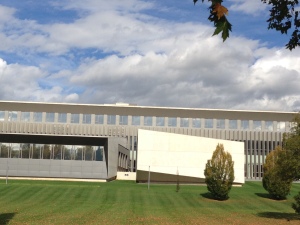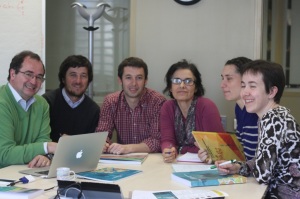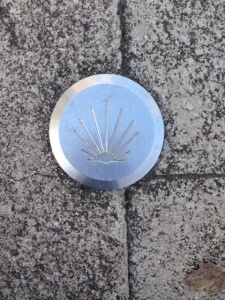
I have known and worked with Dr Carlos Centeno since we first met at a conference of the EAPC in Geneva in 1999. Over the years, and as our friendship has grown, we have mainly collaborated on studies associated with the EAPC European Atlas of Palliative Care. Recently, Carlos has established the ATLANTES research programme within the Institute for Culture and Society, at the University of Navarra, where he is Professor of Palliative Medicine. The programme is wide-ranging in character and bold in the scope of its ambition. I was therefore delighted earlier this year to be appointed as a Visiting Professor at the University of Navarra, with the aim of working with ATLANTES and supporting its growing team of researchers.
Modernist architecture at the University of Navarra
This post is an introduction to the varied work of ATLANTES. I see the programme in three parts: 1) the ‘intangibles ‘of palliative care; 2) the ‘message’ of palliative care; and 3) the ‘development and indicators’ of palliative care. The programme works from the conviction that it is possible to spread the essential values of palliative care in society as well as amongst professionals and policy makers. It seeks to improve the understanding of patients with non-curable illnesses – both in society and in medicine. It also pays close attention to the concept of ‘dignity’ in the face of life-threatening illness, and particularly the emotional and spiritual dimensions this may entail.
The multidisciplinary ATLANTES team is based in the northern Spain city of Pamplona, at the Institute for Culture and Society, on the beautiful campus of the University of Navarra. It seeks to combine various academic disciplines. This picture below shows, from left to right: Carlos Centeno (Physician), Eduardo Garralda (Historian), José Miguel Carrasco (Epidemiologist), Isabel Gortari (Philosopher) , Kathrin Woitha (Public Health) and María Arantzamendi (Nurse) – core members of the local team . In additonal the international team members include: Nunziatta Commoretto (Nurse, Italy), Carol Robinson (Nurse, Canada), José Pereira (Physician, Canada) and myself. there is also a wide range of other collaborators, both in Spain and further afield.
The core team of ATLANTES
Intangibles
This part of the programme includes a focus on some challenging aspects of giving and receiving palliative care. A series of studies is underway on ‘gratitude’ for care received and how this is expressed in relatives’ letters to palliative care services, not only in Spain but also in other countries and cultures. There is an active strand of work focussed on Dignity Therapy and the work of Harvey Chochinov. The team is also preparing a systematic review of common ethical dilemmas found in clinical practice. My own work on the history of palliative care and the special role of Cicely Saunders and her work on spiritual care also supports this part of ATLANTES
Development
This work builds on the considerable achievements of the European Association for Palliative Care Task Force on Development, which has been so ably chaired by Carlos Centeno over the years and which has led to the publication of two European atlases of palliative care and several associated papers. Subsequently, the ATLANTES team has supported work for the development of the Latin American atlas of palliative care and is now working with colleagues in Beirut with a view to producing an atlas for the member countries of the Arab League. These projects have also fired a deeper interest in indicators of development, how they can be refined and what they can contribute to the ranking of palliative care provision across countries. A linked piece of work involving ATLANTES is the Insup-C European project on palliative care integration.
Message
At the core of this part of the programme is an exciting innovative study which is exploring how palliative care has been portrayed within print, radio and television in Spain in recent years. A huge corpus of material has been captured for this work and the process of analysis is now underway. How are ‘messages’ about palliative care constructed in the media – and how can they be influenced and altered for the benefit of palliative care? A related study is examining the reactions to the palliative care curriculum of medical students in different European universities. And there is also an idea to take a project on the message of palliative care into the high schools of the Navarra region.
Overall aims
The key aim of ATLANTES is to promote the professional and public understanding of palliative care values, practices and development, in order to expand its scope and influence. The team seeks to carry out this work in a manner consistent with the ethos of an academic institution: scientific investigation, professional training and systematic dissemination of the knowledge acquired. The social impact of the programme is directly related to the verification of the fundamental hypothesis: Is it possible to foster a change in the social mentality with regard to terminal illnesses and professional care at the end of life? ATLANTES operates from the assumption that the study and dissemination of palliative care development is itself a powerful engine for development. It seeks to encourage wider public engagement with the ethical and clinical challenges that occur in the last phases of life. And it strives to foster new forms of communication and to present palliative care to the wider society – thereby clarifying some of the confusions about palliative medicine, terminal sedation and euthanasia.
The scallop shell symbol of the Camino
The pilgrimage that winds its way across France and Northern Spain to Santiago de Compostela takes a route through the campus of the University of Navarra. It Is marked by the distinctive symbol of the shell (pictured above). Spending time on the campus and walking along part of the Camino reminds us of the journey that is involved in the acquisition of knowledge and understanding. ATLANTES is on such a journey and is stepping out with a sense of optimism, open-ness and discovery.
Please email the team with any thoughts or for further information – egarralda@unav.es and look here for updates and further information – http://www.unav.edu/en/web/instituto-cultura-y-sociedad/proyecto-atlantes





Hi Dr. Clark,
Thanks for the intro on this project. Looking forward to reading periodic updates about the interesting work going on at ATLANTES.
Because you mentioned taking palliative care to high schools in the region, I thought this might be of interest: https://www.hca.org.sg/hospice/services/ycg-activities
It’s a program in Singapore that has similar aims.
Thanks for this helpful link Joy. I will pass it on to the ATLANTES team. Good wishes David C
Thanks Joy, for the helpful information and the web address. I have already send a message to this colleagues. We are in a phase of project design and any other information regarding experiences of teach palliative care in high school could be very very useful for us.
[…] trabajo en el Instituto Cultura y Sociedad de la Universidad de Navarra, como investigador en el “Programa ATLANTES: dignidad humana, enfermedad avanzada y cuidados paliativos”, donde tratamos de combinar la investigación en el campo de la salud con el de las ciencias […]